Financial Accounting Assignment: Theories and Practices
VerifiedAdded on 2020/04/01
|6
|1438
|36
Homework Assignment
AI Summary
This financial accounting assignment addresses two key questions. The first question explores Positive Accounting Theory, contrasting it with normative accounting theory and differentiating between agency theory and contracting theory. It also discusses agency costs and critiques of Positive Accounting Theory, alongside an explanation of market efficiency and its three forms. The second question focuses on Corporate Social Responsibility (CSR), defining it and identifying environmental issues affecting accounting. It also covers social reporting, its types, and the factors driving increased corporate social accountability, as well as the role of governments in regulating environmental issues. The assignment concludes with a reflection on the compliance of companies with social reporting.
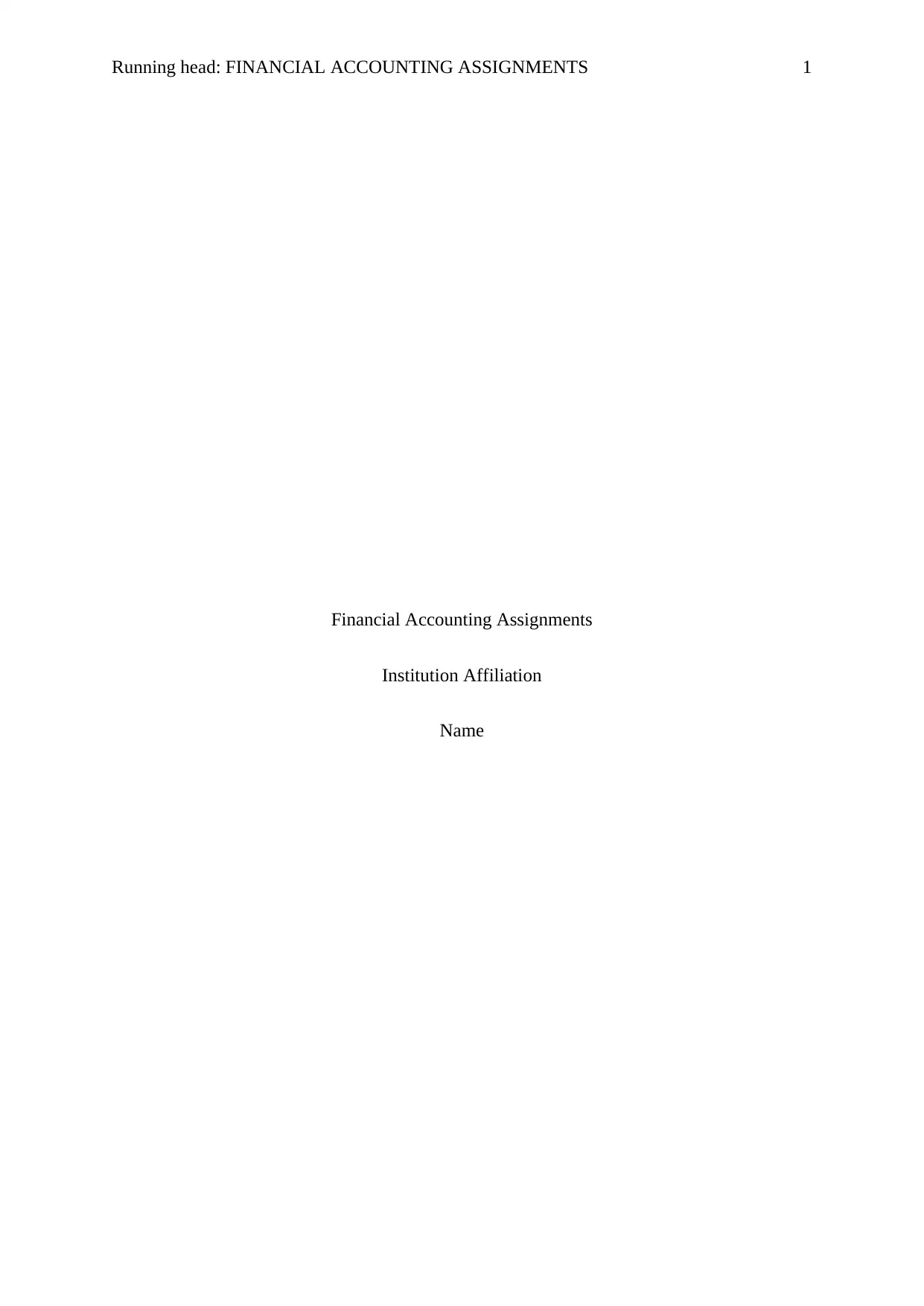
Running head: FINANCIAL ACCOUNTING ASSIGNMENTS 1
Financial Accounting Assignments
Institution Affiliation
Name
Financial Accounting Assignments
Institution Affiliation
Name
Paraphrase This Document
Need a fresh take? Get an instant paraphrase of this document with our AI Paraphraser
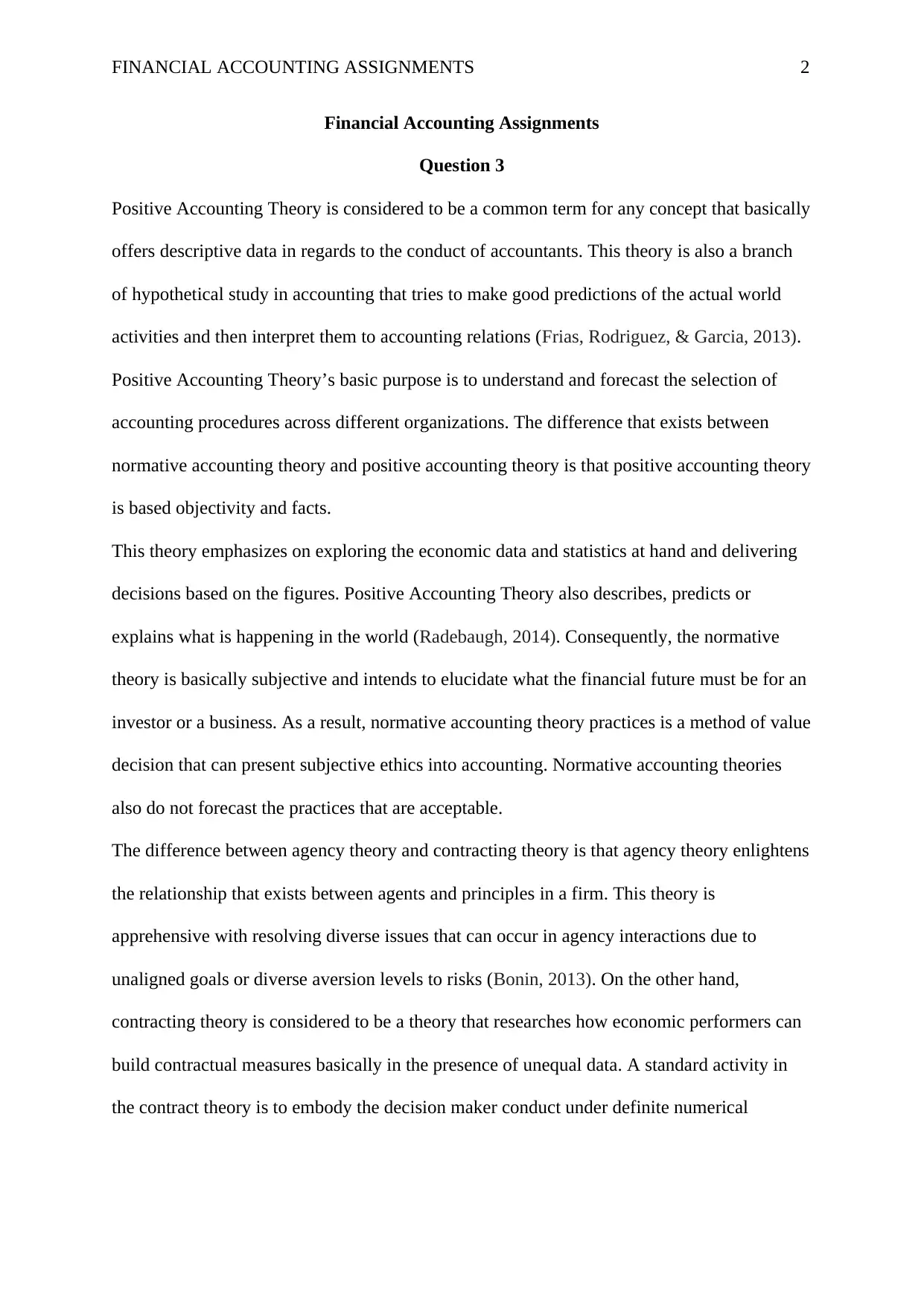
FINANCIAL ACCOUNTING ASSIGNMENTS 2
Financial Accounting Assignments
Question 3
Positive Accounting Theory is considered to be a common term for any concept that basically
offers descriptive data in regards to the conduct of accountants. This theory is also a branch
of hypothetical study in accounting that tries to make good predictions of the actual world
activities and then interpret them to accounting relations (Frias, Rodriguez, & Garcia, 2013).
Positive Accounting Theory’s basic purpose is to understand and forecast the selection of
accounting procedures across different organizations. The difference that exists between
normative accounting theory and positive accounting theory is that positive accounting theory
is based objectivity and facts.
This theory emphasizes on exploring the economic data and statistics at hand and delivering
decisions based on the figures. Positive Accounting Theory also describes, predicts or
explains what is happening in the world (Radebaugh, 2014). Consequently, the normative
theory is basically subjective and intends to elucidate what the financial future must be for an
investor or a business. As a result, normative accounting theory practices is a method of value
decision that can present subjective ethics into accounting. Normative accounting theories
also do not forecast the practices that are acceptable.
The difference between agency theory and contracting theory is that agency theory enlightens
the relationship that exists between agents and principles in a firm. This theory is
apprehensive with resolving diverse issues that can occur in agency interactions due to
unaligned goals or diverse aversion levels to risks (Bonin, 2013). On the other hand,
contracting theory is considered to be a theory that researches how economic performers can
build contractual measures basically in the presence of unequal data. A standard activity in
the contract theory is to embody the decision maker conduct under definite numerical
Financial Accounting Assignments
Question 3
Positive Accounting Theory is considered to be a common term for any concept that basically
offers descriptive data in regards to the conduct of accountants. This theory is also a branch
of hypothetical study in accounting that tries to make good predictions of the actual world
activities and then interpret them to accounting relations (Frias, Rodriguez, & Garcia, 2013).
Positive Accounting Theory’s basic purpose is to understand and forecast the selection of
accounting procedures across different organizations. The difference that exists between
normative accounting theory and positive accounting theory is that positive accounting theory
is based objectivity and facts.
This theory emphasizes on exploring the economic data and statistics at hand and delivering
decisions based on the figures. Positive Accounting Theory also describes, predicts or
explains what is happening in the world (Radebaugh, 2014). Consequently, the normative
theory is basically subjective and intends to elucidate what the financial future must be for an
investor or a business. As a result, normative accounting theory practices is a method of value
decision that can present subjective ethics into accounting. Normative accounting theories
also do not forecast the practices that are acceptable.
The difference between agency theory and contracting theory is that agency theory enlightens
the relationship that exists between agents and principles in a firm. This theory is
apprehensive with resolving diverse issues that can occur in agency interactions due to
unaligned goals or diverse aversion levels to risks (Bonin, 2013). On the other hand,
contracting theory is considered to be a theory that researches how economic performers can
build contractual measures basically in the presence of unequal data. A standard activity in
the contract theory is to embody the decision maker conduct under definite numerical
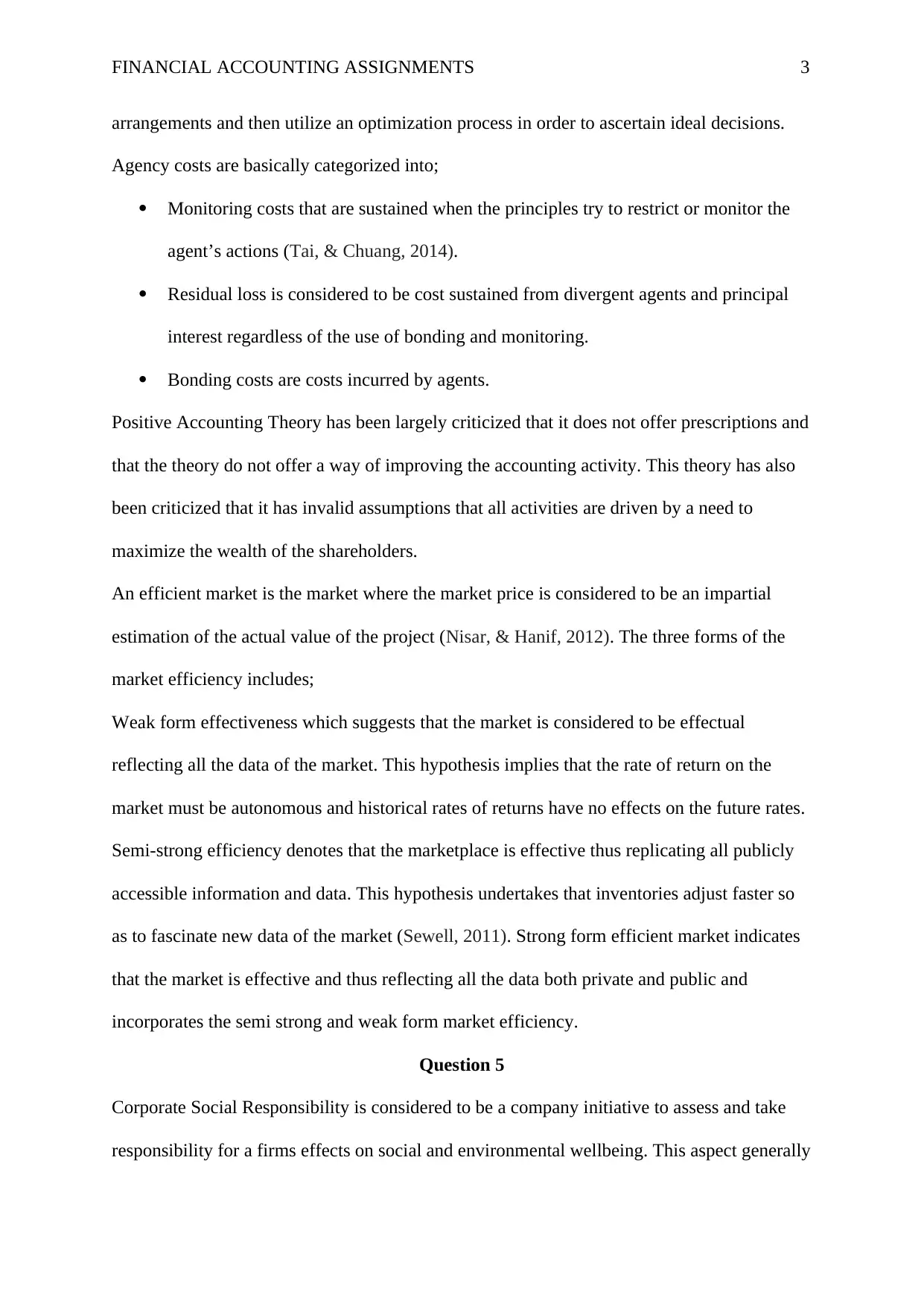
FINANCIAL ACCOUNTING ASSIGNMENTS 3
arrangements and then utilize an optimization process in order to ascertain ideal decisions.
Agency costs are basically categorized into;
Monitoring costs that are sustained when the principles try to restrict or monitor the
agent’s actions (Tai, & Chuang, 2014).
Residual loss is considered to be cost sustained from divergent agents and principal
interest regardless of the use of bonding and monitoring.
Bonding costs are costs incurred by agents.
Positive Accounting Theory has been largely criticized that it does not offer prescriptions and
that the theory do not offer a way of improving the accounting activity. This theory has also
been criticized that it has invalid assumptions that all activities are driven by a need to
maximize the wealth of the shareholders.
An efficient market is the market where the market price is considered to be an impartial
estimation of the actual value of the project (Nisar, & Hanif, 2012). The three forms of the
market efficiency includes;
Weak form effectiveness which suggests that the market is considered to be effectual
reflecting all the data of the market. This hypothesis implies that the rate of return on the
market must be autonomous and historical rates of returns have no effects on the future rates.
Semi-strong efficiency denotes that the marketplace is effective thus replicating all publicly
accessible information and data. This hypothesis undertakes that inventories adjust faster so
as to fascinate new data of the market (Sewell, 2011). Strong form efficient market indicates
that the market is effective and thus reflecting all the data both private and public and
incorporates the semi strong and weak form market efficiency.
Question 5
Corporate Social Responsibility is considered to be a company initiative to assess and take
responsibility for a firms effects on social and environmental wellbeing. This aspect generally
arrangements and then utilize an optimization process in order to ascertain ideal decisions.
Agency costs are basically categorized into;
Monitoring costs that are sustained when the principles try to restrict or monitor the
agent’s actions (Tai, & Chuang, 2014).
Residual loss is considered to be cost sustained from divergent agents and principal
interest regardless of the use of bonding and monitoring.
Bonding costs are costs incurred by agents.
Positive Accounting Theory has been largely criticized that it does not offer prescriptions and
that the theory do not offer a way of improving the accounting activity. This theory has also
been criticized that it has invalid assumptions that all activities are driven by a need to
maximize the wealth of the shareholders.
An efficient market is the market where the market price is considered to be an impartial
estimation of the actual value of the project (Nisar, & Hanif, 2012). The three forms of the
market efficiency includes;
Weak form effectiveness which suggests that the market is considered to be effectual
reflecting all the data of the market. This hypothesis implies that the rate of return on the
market must be autonomous and historical rates of returns have no effects on the future rates.
Semi-strong efficiency denotes that the marketplace is effective thus replicating all publicly
accessible information and data. This hypothesis undertakes that inventories adjust faster so
as to fascinate new data of the market (Sewell, 2011). Strong form efficient market indicates
that the market is effective and thus reflecting all the data both private and public and
incorporates the semi strong and weak form market efficiency.
Question 5
Corporate Social Responsibility is considered to be a company initiative to assess and take
responsibility for a firms effects on social and environmental wellbeing. This aspect generally
⊘ This is a preview!⊘
Do you want full access?
Subscribe today to unlock all pages.

Trusted by 1+ million students worldwide
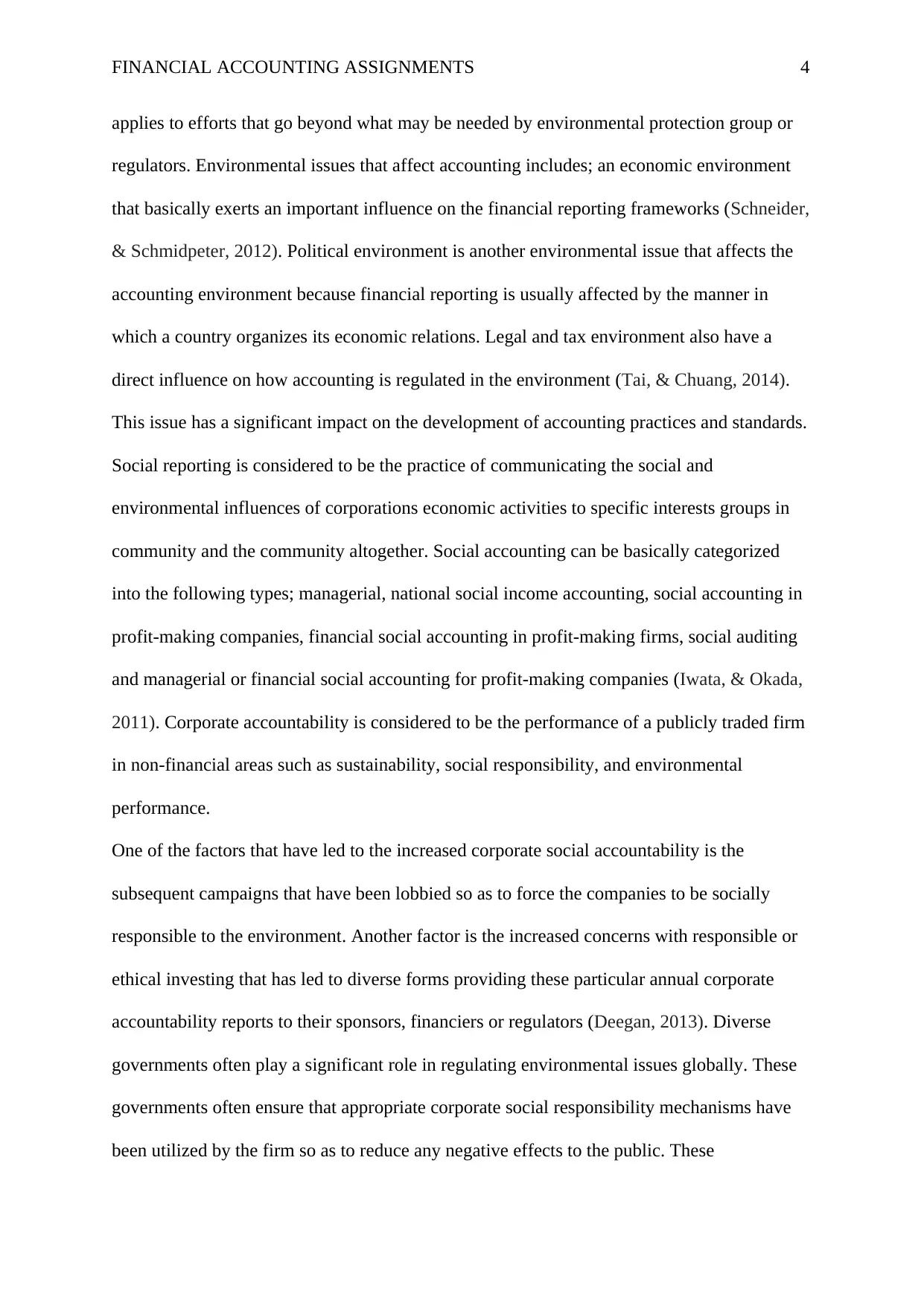
FINANCIAL ACCOUNTING ASSIGNMENTS 4
applies to efforts that go beyond what may be needed by environmental protection group or
regulators. Environmental issues that affect accounting includes; an economic environment
that basically exerts an important influence on the financial reporting frameworks (Schneider,
& Schmidpeter, 2012). Political environment is another environmental issue that affects the
accounting environment because financial reporting is usually affected by the manner in
which a country organizes its economic relations. Legal and tax environment also have a
direct influence on how accounting is regulated in the environment (Tai, & Chuang, 2014).
This issue has a significant impact on the development of accounting practices and standards.
Social reporting is considered to be the practice of communicating the social and
environmental influences of corporations economic activities to specific interests groups in
community and the community altogether. Social accounting can be basically categorized
into the following types; managerial, national social income accounting, social accounting in
profit-making companies, financial social accounting in profit-making firms, social auditing
and managerial or financial social accounting for profit-making companies (Iwata, & Okada,
2011). Corporate accountability is considered to be the performance of a publicly traded firm
in non-financial areas such as sustainability, social responsibility, and environmental
performance.
One of the factors that have led to the increased corporate social accountability is the
subsequent campaigns that have been lobbied so as to force the companies to be socially
responsible to the environment. Another factor is the increased concerns with responsible or
ethical investing that has led to diverse forms providing these particular annual corporate
accountability reports to their sponsors, financiers or regulators (Deegan, 2013). Diverse
governments often play a significant role in regulating environmental issues globally. These
governments often ensure that appropriate corporate social responsibility mechanisms have
been utilized by the firm so as to reduce any negative effects to the public. These
applies to efforts that go beyond what may be needed by environmental protection group or
regulators. Environmental issues that affect accounting includes; an economic environment
that basically exerts an important influence on the financial reporting frameworks (Schneider,
& Schmidpeter, 2012). Political environment is another environmental issue that affects the
accounting environment because financial reporting is usually affected by the manner in
which a country organizes its economic relations. Legal and tax environment also have a
direct influence on how accounting is regulated in the environment (Tai, & Chuang, 2014).
This issue has a significant impact on the development of accounting practices and standards.
Social reporting is considered to be the practice of communicating the social and
environmental influences of corporations economic activities to specific interests groups in
community and the community altogether. Social accounting can be basically categorized
into the following types; managerial, national social income accounting, social accounting in
profit-making companies, financial social accounting in profit-making firms, social auditing
and managerial or financial social accounting for profit-making companies (Iwata, & Okada,
2011). Corporate accountability is considered to be the performance of a publicly traded firm
in non-financial areas such as sustainability, social responsibility, and environmental
performance.
One of the factors that have led to the increased corporate social accountability is the
subsequent campaigns that have been lobbied so as to force the companies to be socially
responsible to the environment. Another factor is the increased concerns with responsible or
ethical investing that has led to diverse forms providing these particular annual corporate
accountability reports to their sponsors, financiers or regulators (Deegan, 2013). Diverse
governments often play a significant role in regulating environmental issues globally. These
governments often ensure that appropriate corporate social responsibility mechanisms have
been utilized by the firm so as to reduce any negative effects to the public. These
Paraphrase This Document
Need a fresh take? Get an instant paraphrase of this document with our AI Paraphraser
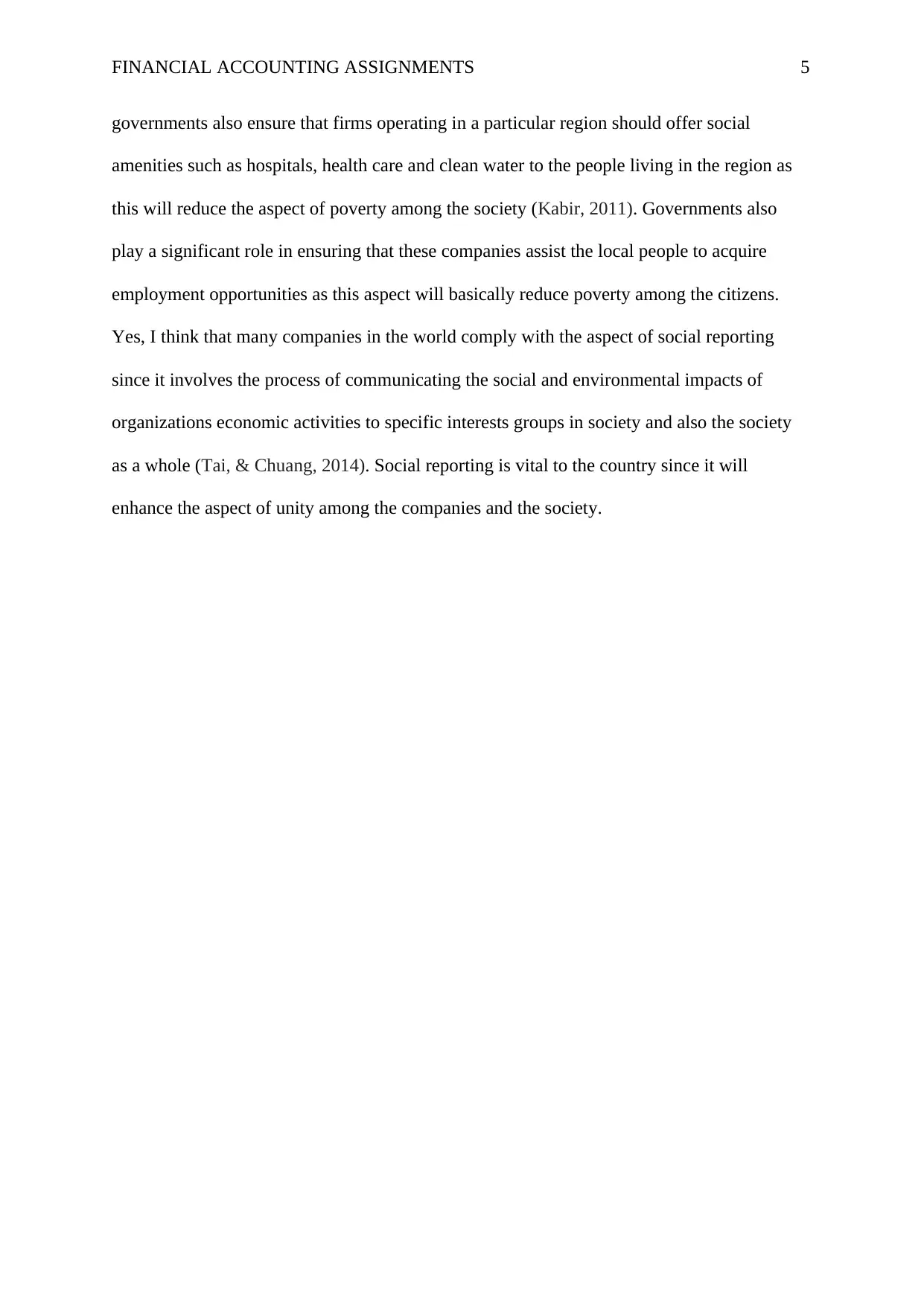
FINANCIAL ACCOUNTING ASSIGNMENTS 5
governments also ensure that firms operating in a particular region should offer social
amenities such as hospitals, health care and clean water to the people living in the region as
this will reduce the aspect of poverty among the society (Kabir, 2011). Governments also
play a significant role in ensuring that these companies assist the local people to acquire
employment opportunities as this aspect will basically reduce poverty among the citizens.
Yes, I think that many companies in the world comply with the aspect of social reporting
since it involves the process of communicating the social and environmental impacts of
organizations economic activities to specific interests groups in society and also the society
as a whole (Tai, & Chuang, 2014). Social reporting is vital to the country since it will
enhance the aspect of unity among the companies and the society.
governments also ensure that firms operating in a particular region should offer social
amenities such as hospitals, health care and clean water to the people living in the region as
this will reduce the aspect of poverty among the society (Kabir, 2011). Governments also
play a significant role in ensuring that these companies assist the local people to acquire
employment opportunities as this aspect will basically reduce poverty among the citizens.
Yes, I think that many companies in the world comply with the aspect of social reporting
since it involves the process of communicating the social and environmental impacts of
organizations economic activities to specific interests groups in society and also the society
as a whole (Tai, & Chuang, 2014). Social reporting is vital to the country since it will
enhance the aspect of unity among the companies and the society.
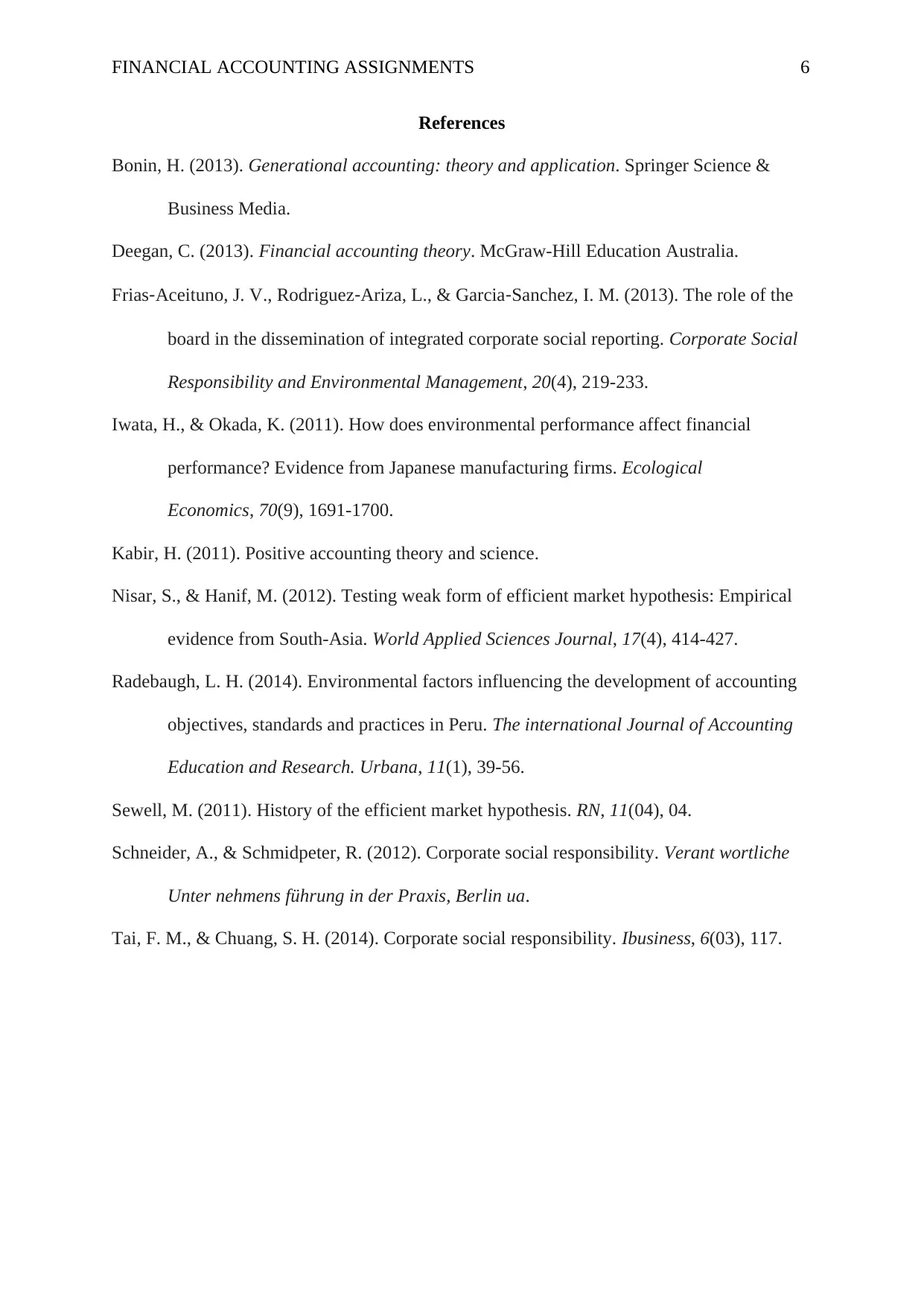
FINANCIAL ACCOUNTING ASSIGNMENTS 6
References
Bonin, H. (2013). Generational accounting: theory and application. Springer Science &
Business Media.
Deegan, C. (2013). Financial accounting theory. McGraw-Hill Education Australia.
Frias‐Aceituno, J. V., Rodriguez‐Ariza, L., & Garcia‐Sanchez, I. M. (2013). The role of the
board in the dissemination of integrated corporate social reporting. Corporate Social
Responsibility and Environmental Management, 20(4), 219-233.
Iwata, H., & Okada, K. (2011). How does environmental performance affect financial
performance? Evidence from Japanese manufacturing firms. Ecological
Economics, 70(9), 1691-1700.
Kabir, H. (2011). Positive accounting theory and science.
Nisar, S., & Hanif, M. (2012). Testing weak form of efficient market hypothesis: Empirical
evidence from South-Asia. World Applied Sciences Journal, 17(4), 414-427.
Radebaugh, L. H. (2014). Environmental factors influencing the development of accounting
objectives, standards and practices in Peru. The international Journal of Accounting
Education and Research. Urbana, 11(1), 39-56.
Sewell, M. (2011). History of the efficient market hypothesis. RN, 11(04), 04.
Schneider, A., & Schmidpeter, R. (2012). Corporate social responsibility. Verant wortliche
Unter nehmens führung in der Praxis, Berlin ua.
Tai, F. M., & Chuang, S. H. (2014). Corporate social responsibility. Ibusiness, 6(03), 117.
References
Bonin, H. (2013). Generational accounting: theory and application. Springer Science &
Business Media.
Deegan, C. (2013). Financial accounting theory. McGraw-Hill Education Australia.
Frias‐Aceituno, J. V., Rodriguez‐Ariza, L., & Garcia‐Sanchez, I. M. (2013). The role of the
board in the dissemination of integrated corporate social reporting. Corporate Social
Responsibility and Environmental Management, 20(4), 219-233.
Iwata, H., & Okada, K. (2011). How does environmental performance affect financial
performance? Evidence from Japanese manufacturing firms. Ecological
Economics, 70(9), 1691-1700.
Kabir, H. (2011). Positive accounting theory and science.
Nisar, S., & Hanif, M. (2012). Testing weak form of efficient market hypothesis: Empirical
evidence from South-Asia. World Applied Sciences Journal, 17(4), 414-427.
Radebaugh, L. H. (2014). Environmental factors influencing the development of accounting
objectives, standards and practices in Peru. The international Journal of Accounting
Education and Research. Urbana, 11(1), 39-56.
Sewell, M. (2011). History of the efficient market hypothesis. RN, 11(04), 04.
Schneider, A., & Schmidpeter, R. (2012). Corporate social responsibility. Verant wortliche
Unter nehmens führung in der Praxis, Berlin ua.
Tai, F. M., & Chuang, S. H. (2014). Corporate social responsibility. Ibusiness, 6(03), 117.
⊘ This is a preview!⊘
Do you want full access?
Subscribe today to unlock all pages.

Trusted by 1+ million students worldwide
1 out of 6
Related Documents
Your All-in-One AI-Powered Toolkit for Academic Success.
+13062052269
info@desklib.com
Available 24*7 on WhatsApp / Email
![[object Object]](/_next/static/media/star-bottom.7253800d.svg)
Unlock your academic potential
Copyright © 2020–2026 A2Z Services. All Rights Reserved. Developed and managed by ZUCOL.





